Senta's story is likely to be typical of many young East German victims of abuse. Senta was a talent in her discipline, rhythmic gymnastics. At the age of nine she was spotted and sent to a sports boarding school, at 13 she became a member of the youth national team, later the national team.
She describes the sports boarding school as a “closed system, comparable to an ivory tower”. She only sees her parents every three weeks: "They handed over the upbringing and care for me to the sports boarding school." They weren't there when Senta got caught by a doctor in the training camp who didn't just give her and the other girls painkillers and doping substances, but also performs sexual acts on them.
“I remember our great fear of who would be selected again in the evening and had to go to that doctor alone. Neither of them ever told the others what happened,” says Senta. Only years later does she manage to face her repressed memories and come to terms with what happened. Her conclusion: "If you are not helped as a child, then you learn to remain silent."
Senta's report is one of the 72 eyewitness reports that the Independent Commission on Child Sexual Abuse has reviewed in its most recent case study on abuse in sport. Since 2016, the commission has been calling on people who have experienced sexual violence at home, in school, in the church and in institutions to break their silence. The motto: "Stories that count."
The most recent case study shows that abuse was particularly prevalent in performance and competitive mass sports, less often in leisure and school sports. Almost a fifth of the reports evaluated relate to experiences of violence within the framework of the GDR sports system - an area for which there is hardly any scientific knowledge to date, as the study states.
The peculiarities of this system, with early talent identification and intensive support in sports schools and boarding schools, would have favored attacks. The overriding goal of sporting success often allowed the children to tolerate the experience of violence, said study director Bettina Rulofs from the Cologne Sport University: "The children were defenseless against the violent acts of trainers, doctors and other sports officials."
The positive narrative of sport in particular makes it difficult for those affected to receive attention and help for the injustice and suffering experienced in sport, said Rulofs. For them, sport does not redeem the promise of health, personal development and athletic performance. On the contrary: "They suffered lifelong damage." According to the study, two thirds of those affected were regularly subjected to sexual violence, sometimes over a long period of time - mostly by male trainers, supervisors or teachers in positions of power. In addition to sexual assault and rape, punches, kicks, choking and emotional violence were also reported, Rulofs said.
The report shows that only very few of those affected confided in anyone about their experiences. In addition to threats and intimidation, shame and the feeling of being partly responsible for what happened also played a role. In addition, many feared losing their beloved sport and position in the team or causing damage to the club. "They often regarded their own suffering as the lesser evil and did not want to be responsible for the fact that the departure of the coach, for example, had a negative impact on the training group or the entire club," says the study.
For example, Hatice reports that despite the attacks, she felt grateful and obliged to the perpetrator because he also supported her outside of sport due to her precarious family circumstances. "Well, I was dependent on him," she says. “I was always afraid that he would fly. I've always had the feeling that if it weren't for him, I would have ended up in the gutter."
It is also because of such mechanisms that very few cases of sexual abuse of children have been uncovered and processed, said Heiner Keupp, a member of the processing commission. "We need a right to processing for those affected and an obligation for processing for the institutions." The Ministry of the Interior has committed to creating a "Safe Sport" center that will serve as an independent contact point for those affected. So far, however, there has been no commitment from organized sport to participate in the financing.
"Kick-off Politics" is WELT's daily news podcast. The most important topic analyzed by WELT editors and the dates of the day. Subscribe to the podcast on Spotify, Apple Podcasts, Amazon Music, among others, or directly via RSS feed.

 B:SM will break its investment record this year with 62 million euros
B:SM will break its investment record this year with 62 million euros War in Ukraine: when kyiv attacks Russia with inflatable balloons loaded with explosives
War in Ukraine: when kyiv attacks Russia with inflatable balloons loaded with explosives United States: divided on the question of presidential immunity, the Supreme Court offers respite to Trump
United States: divided on the question of presidential immunity, the Supreme Court offers respite to Trump Maurizio Molinari: “the Scurati affair, a European injury”
Maurizio Molinari: “the Scurati affair, a European injury” Irritable bowel syndrome: the effectiveness of low-carbohydrate diets is confirmed
Irritable bowel syndrome: the effectiveness of low-carbohydrate diets is confirmed Beware of the three main sources of poisoning in children
Beware of the three main sources of poisoning in children First three cases of “native” cholera confirmed in Mayotte
First three cases of “native” cholera confirmed in Mayotte Meningitis: compulsory vaccination for babies will be extended in 2025
Meningitis: compulsory vaccination for babies will be extended in 2025 When traveling abroad, money is a source of stress for seven out of ten French people
When traveling abroad, money is a source of stress for seven out of ten French people Elon Musk arrives in China to negotiate data transfer and deployment of Tesla autopilot
Elon Musk arrives in China to negotiate data transfer and deployment of Tesla autopilot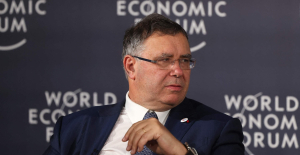 Patrick Pouyanné, CEO of TotalEnergies, is very reserved about the rapid growth of green hydrogen
Patrick Pouyanné, CEO of TotalEnergies, is very reserved about the rapid growth of green hydrogen In the United States, a Boeing 767 loses its emergency slide shortly after takeoff
In the United States, a Boeing 767 loses its emergency slide shortly after takeoff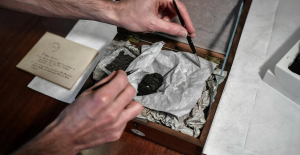 A charred papyrus from Herculaneum reveals its secrets about Plato
A charred papyrus from Herculaneum reveals its secrets about Plato The watch of the richest passenger on the Titanic sold for 1.175 million pounds at auction
The watch of the richest passenger on the Titanic sold for 1.175 million pounds at auction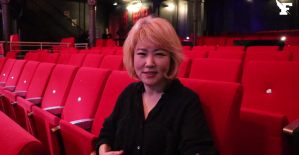 Youn Sun Nah: jazz with nuance and delicacy
Youn Sun Nah: jazz with nuance and delicacy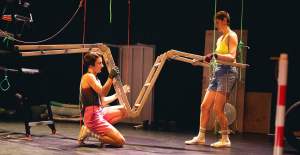 Paris Globe, a new international theater festival
Paris Globe, a new international theater festival Skoda Kodiaq 2024: a 'beast' plug-in hybrid SUV
Skoda Kodiaq 2024: a 'beast' plug-in hybrid SUV Tesla launches a new Model Y with 600 km of autonomy at a "more accessible price"
Tesla launches a new Model Y with 600 km of autonomy at a "more accessible price" The 10 best-selling cars in March 2024 in Spain: sales fall due to Easter
The 10 best-selling cars in March 2024 in Spain: sales fall due to Easter A private jet company buys more than 100 flying cars
A private jet company buys more than 100 flying cars This is how housing prices have changed in Spain in the last decade
This is how housing prices have changed in Spain in the last decade The home mortgage firm drops 10% in January and interest soars to 3.46%
The home mortgage firm drops 10% in January and interest soars to 3.46% The jewel of the Rocío de Nagüeles urbanization: a dream villa in Marbella
The jewel of the Rocío de Nagüeles urbanization: a dream villa in Marbella Rental prices grow by 7.3% in February: where does it go up and where does it go down?
Rental prices grow by 7.3% in February: where does it go up and where does it go down? Even on a mission for NATO, the Charles-de-Gaulle remains under French control, Lecornu responds to Mélenchon
Even on a mission for NATO, the Charles-de-Gaulle remains under French control, Lecornu responds to Mélenchon “Deadly Europe”, “economic decline”, immigration… What to remember from Emmanuel Macron’s speech at the Sorbonne
“Deadly Europe”, “economic decline”, immigration… What to remember from Emmanuel Macron’s speech at the Sorbonne Sale of Biogaran: The Republicans write to Emmanuel Macron
Sale of Biogaran: The Republicans write to Emmanuel Macron Europeans: “All those who claim that we don’t need Europe are liars”, criticizes Bayrou
Europeans: “All those who claim that we don’t need Europe are liars”, criticizes Bayrou These French cities that will boycott the World Cup in Qatar
These French cities that will boycott the World Cup in Qatar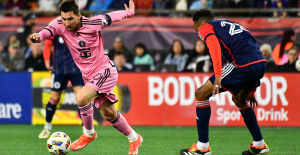 MLS: new double for Messi who offers victory to Miami
MLS: new double for Messi who offers victory to Miami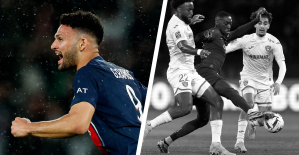 PSG-Le Havre: Ramos on his way, Kolo Muani at the bottom of the hole… Favorites and scratches
PSG-Le Havre: Ramos on his way, Kolo Muani at the bottom of the hole… Favorites and scratches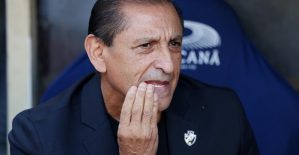 Football: Vasco da Gama separates from its Argentinian coach Ramon Diaz
Football: Vasco da Gama separates from its Argentinian coach Ramon Diaz F1: for the French, Ayrton Senna is the 2nd best driver in history ahead of Prost
F1: for the French, Ayrton Senna is the 2nd best driver in history ahead of Prost

















